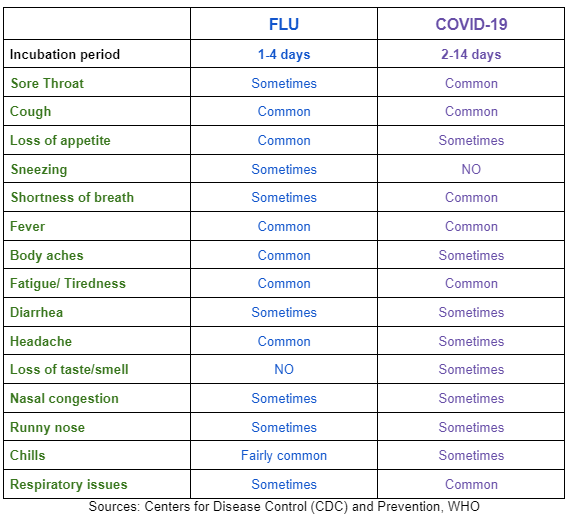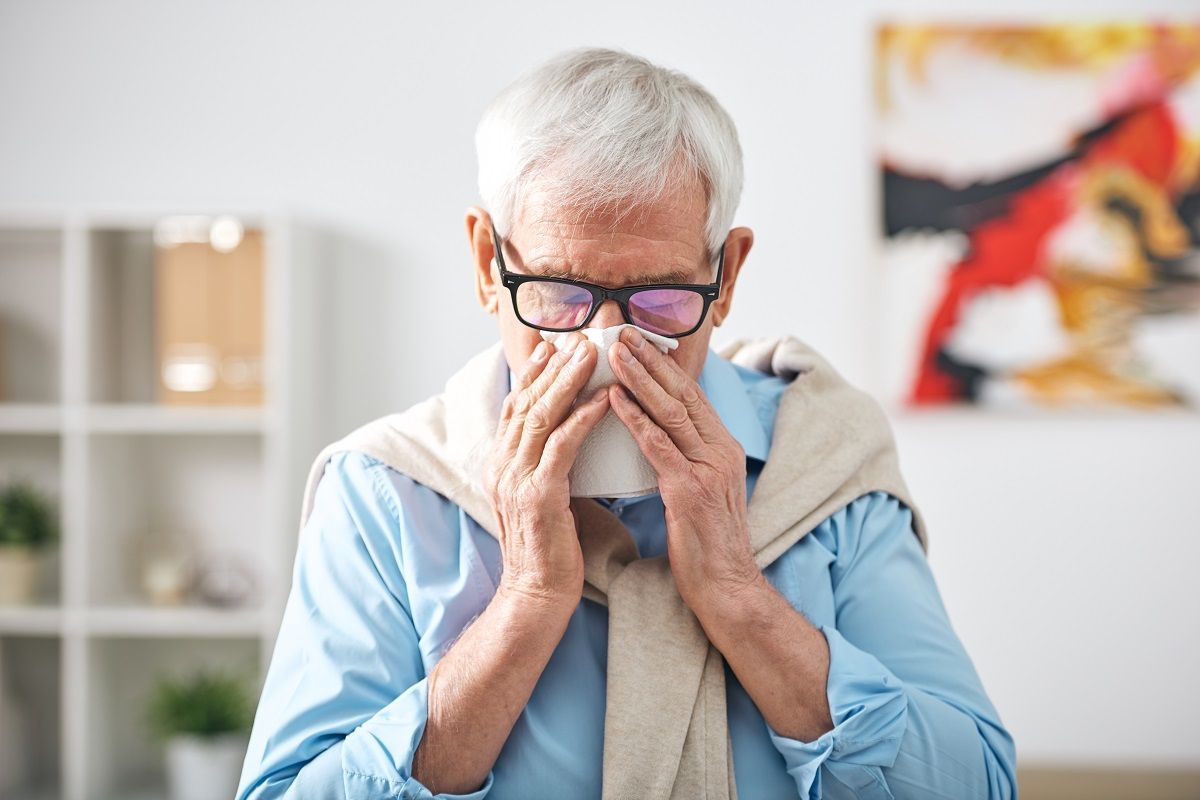Our Location
Elige tu idioma:
COVID vs. Flu: Know the Differences

Nowadays, it’s common to assume that you have COVID-19 as soon as you develop a cough or feel unwell. Seniors might be among those most affected. However, that is not always the reason. Considering that the symptoms of COVID-19 are similar to the flu, you need to be cautious. Influenza (flu) and COVID-19 both pose risks to our health. If you are aware of the illness you are suffering from, you can protect others and your health. But how can you differentiate between the two respiratory diseases?
In this article, we’ll provide you with enough information and know the differences between the two.
What Is COVID-19?
Coronavirus disease (COVID-19) is an infectious disease caused by SARS-CoV-2 virus strain. The
World Health Organization (WHO) identified SARS-CoV-2 in early 2020 after an outbreak in China in December 2019. It rapidly spread to other parts of the world. Furthermore, there are four common types of coronavirus and only cause mild symptoms (like a cold). Some of the SARS-CoV-2 strains can cause critical illness to certain people. For instance, people with severe medical conditions like heart failure and lung complications. Senior groups also seem to be at higher risk of developing severe COVID-19 illness.
The Flu or COVID-19?
Flu is the common name for influenza. It is a viral infection that affects your respiratory system and can last for 5 to 7 days. It is also highly contagious. A person can pass it on while talking, through physical contact, or by breathing in droplets.
The good news is most people recover from the flu on their own. After all, some signs of flu can be subtle or more obvious. However, its complications can still be harmful.
Both influenza (flu) and COVID-19 are contagious. However, the viruses causing both of these respiratory illnesses are different. SARS-CoV-2 is the new coronavirus that causes COVID-19, while influenza A and B viruses cause flu.
The following table outlines the flu symptoms vs. COVID-19:

In addition, COVID-19 and the flu have different onset times. COVID-19 symptoms typically appear 2-14 days, while flu symptoms often appear 1-4 days after exposure. Another thing is how their symptoms manifest in patients. Flu and COVID-19 both cause coughs and shortness of breath, but COVID-19 symptoms tend to persist longer.
On the other hand, children are at less risk from COVID-19 than adults and seniors. However, a
multisystem inflammatory syndrome in children (MIS-C) is associated with COVID-19 and can affect children of all ages.
Spread and Severity of Flu vs. COVID-19
Compared to the flu, COVID-19 is more contagious and spreads faster. COVID-19 has a higher mortality rate than the flu. According to the Centers for Disease Control and Prevention (CDC), more than 38 million Americans have had COVID-19. There were 630,000 deaths related to COVID-19 in the U.S. in 2020 and 2021. The U.S. also suffered 38 million flu cases from 2019-2020, and about 22,000 people died from it.
Prevention of COVID-19 and Influenza
According to the CDC, getting the flu vaccine is the best option for flu protection and its complications. It reduces your risk of contracting COVID-19, though it doesn’t prevent you from contracting it. Likewise, the vaccine can be given either as an injection or as a nasal spray.
Some COVID-19 vaccines in the United States have received emergency use authorization from the U.S. Food and Drug Administration (FDA). They approved one type of vaccine. In fact, vaccines can prevent you from getting or becoming ill with the COVID-19 virus. That’s why getting a COVID-19 vaccination is the best way to protect yourself. You can also enjoy things you might not have been able to do during the pandemic.
Even so, people who wear masks, wash their hands regularly and practice physical distancing are still vital to prevent the spread of COVID-19.
Period Flu or COVID-19?
Period flu is not the same as influenza or the flu. Instead, it refers to the symptoms that people experience just before their period begins. Influenza and period flu have similar signs, and both share symptoms with COVID-19. Furthermore, COVID-19 is an infectious disease, whereas period flu is not. A test for COVID-19 is the only way to determine if someone has period flu or COVID-19.
What to Do?
Here are a few tips for determining a diagnosis if you experience any of the symptoms mentioned here:
- First, seek medical care if you have any symptoms of COVID-19 or the flu.
- Next, get a test for COVID and influenza as soon as possible. Visit your doctor or local health clinic, or go to urgent care where tests will be available.
- Finally, move forward with the proper treatment after receiving a diagnosis. A doctor might prescribe an antiviral drug for treating the flu, which aids in lessening symptoms and shortening the duration of the illness. People with milder cases of COVID-19 can recover on their own by monitoring their condition.
Call local emergency services if you have persistent chest pain, trouble breathing, confusion, or bluish lips or face.
Ocana Medical Care, located in Tampa, FL, aims to bring you as much information as possible to keep you healthy. We’re in this together. #ocanacares
“Respect. Compassion. Quality. Integrity. These are the values on which Ocana Medical Center was built. Our aim isn’t just to treat you today. We hope to earn your trust and be your healthcare provider for life.”
©2023 Ocana Medical Group, Inc.
USEFUL LINKS
GET IN TOUCH
Call Us Today
Send us Email
Our Location
Ocana Medical Center | All Rights Reserved.












